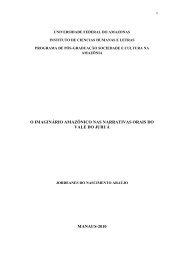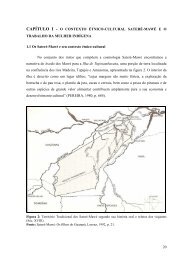somanlu jul dez 2006.pmd - Eventos - Ufam
somanlu jul dez 2006.pmd - Eventos - Ufam
somanlu jul dez 2006.pmd - Eventos - Ufam
You also want an ePaper? Increase the reach of your titles
YUMPU automatically turns print PDFs into web optimized ePapers that Google loves.
“Soldiers” and citizens in the rainforest: Brazilian rubber tappers...<br />
as coercive to their advantage. Still, debt was the most common source of conflict<br />
as tappers sought ways to moderate, challenge or avoid its excesses<br />
(WEINSTEIN, 1983, p. 22-25).<br />
Patrões did use violence or the threat of violence to block tappers from<br />
trading with interloping merchants, with the worst type of brutality typically found<br />
in caucho, rather than hevea extraction. Physical punishment was used to discipline<br />
wayward seringueiros, with the most notorious form entailing tying tappers to a tree<br />
trunk and whipping them. Written accounts corroborate such physical abuse, although<br />
it is difficult to ascertain how widespread it was. 20 In a 1943 investigation by a<br />
government official in Acre into conditions at the Seringal João de Iracema in Xapuri,<br />
José Jefferson de Andrade noted that the “Syrian” owner João Esteves constantly<br />
threatened his seringueiros when they failed to “submit to his will (exploitation), even<br />
going so far as to fire five shots from his revolver at one of them, and enjoying<br />
impunity, as well as other forms of aggression.” 21<br />
Seringalista brutality, however, also risked “betrayal” by workers who might<br />
trade with other merchants, destroy trees and property, revolt, or flee, thereby forcing<br />
the owner to invest in placing new workers. 22 During the battle for rubber, bosses<br />
repeatedly complained of deadbeat tappers or would-be tappers who fled after<br />
they had received advances. Patrões in the hevea regions thus had economic<br />
motivations for promoting a more durable relationship with tappers and avoiding<br />
unnecessary violence.<br />
The paternalism of the boss was an important factor cementing social relations<br />
in the seringais. Bosses sought to weave paternalistic bonds through godparentage,<br />
the extension of credit (particularly during times of need), and the sponsorship of<br />
religious festivals on holy days (WOLFF, 1999, p. 203). In remote, insalubrious regions,<br />
the benevolence of the boss could literally be a matter of life or death. Thus, Raul<br />
Vilhena authorized his supplier, the large commercial firm J.G. Araújo in Manaus, to<br />
pay for treatment of one of his “customers,” José Bezerra, who had fallen ill and<br />
could not extract balata. Vilhena told the Araújo firm to debit the expenses from his<br />
account, and in fact Bezerra was interned at the Beneficiência hospital in Manaus. 23<br />
As in most clientelist systems, however, there was little institutional or legal<br />
recourse to rein in abuse by the bosses, or for that matter by the tappers. Unscrupulous,<br />
desperate, or insolvent bosses clearly could or did not live up to the paternalist ideal,<br />
particularly if they believed that their “customers” had violated the pact by selling to<br />
48 Somanlu, ano 6, n. 2, <strong>jul</strong>./<strong>dez</strong>. 2006






